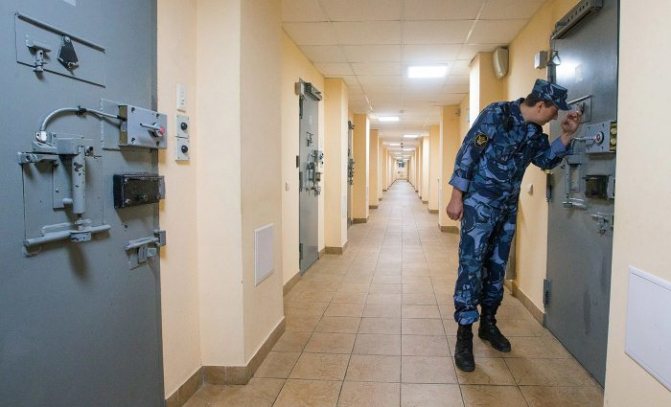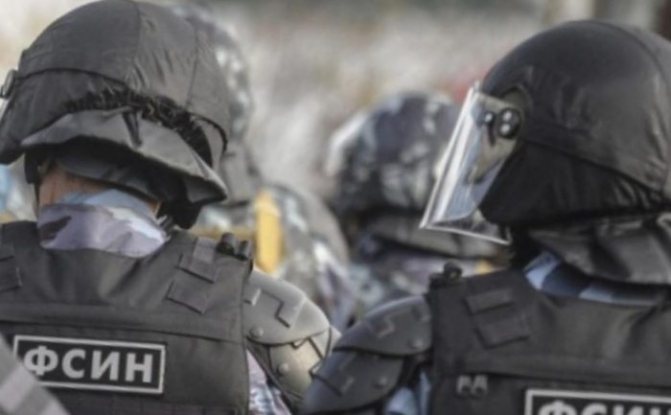The FSIN is a structure that every year (and with every scandal in the media) attracts more and more interest from Russians. Behind this abbreviation lies, no less, the Federal Penitentiary Service - a body that controls convicts, determines their work regime, living conditions, medical care and much more. It is the FSIN employees who determine how comfortable (or unbearable) the life of Russian prisoners, suspects, and those accused of crimes will be.
It should be noted that for a long time the prison sector was under the jurisdiction of the Ministry of Internal Affairs of the Russian Federation, and only in 2004, by presidential decree, a completely new and independent department was formed - the FSIN. However, on the eve of the reform of the Ministry of Internal Affairs, rumors appeared that the Federal Penitentiary Service may simply... not survive 2020! Allegedly, the government is thinking about returning the function of executing court sentences to the tasks of the Ministry of Internal Affairs, and disbanding the FSIN as unnecessary.
This is to blame for the numerous scandals associated with the failure of FSIN employees to fulfill their assigned tasks. A particularly high-profile precedent is associated with Vyacheslav Tsepovyaz, sentenced to 19 years in prison for the murder of 12 people, because his prison menu included red caviar and Kamchatka crabs! However, while some prisoners are treated with excessive care, others are beaten and tortured. Let's find out whether the scandals that have occurred will affect the fate of all employees of the FSIN, will they be transferred to the subordination of the Ministry of Internal Affairs, and what should we generally expect from the 2020 reform?
It's time to find out whether the FSIN can be disbanded in 2020!
Is it possible to increase the length of service in the Federal Penitentiary Service to 25 years?
Based on forecasts for the growth of life expectancy, which has increased significantly over the past 50 years, pension legislation requires revision and adjustment.
If a citizen does not have enough pension points, then his retirement is postponed until the age limit and he may be assigned a social old-age pension:
- men retire at age 65
- women retire at age 60
We have also already published material on raising the retirement age for civil servants.
Table 1. Raising the retirement age for female civil servants
| Year | Retirement age |
| 2018 | 56 |
| 2019 | 56,5 |
| 2020 | 57 |
| 2021 | 57,5 |
| 2022 | 58 |
| 2023 | 58,5 |
| 2024 | 59 |
| 2025 | 59,5 |
| 2026 | 60 |
| 2027 | 60,5 |
| 2028 | 61 |
| 2029 | 61,5 |
| 2030 | 62 |
| 2031 | 62,5 |
| 2032 | 63 |
Table 2. Raising the retirement age for male civil servants
| Year | Retirement age |
| 2018 | 61 |
| 2019 | 61,5 |
| 2020 | 62 |
| 2021 | 62,5 |
| 2022 | 63 |
| 2023 | 63,5 |
| 2024 | 64 |
| 2025 | 64,5 |
| 2026 | 65 |
| 2027 | 65 |
| 2028 | 65 |
| 2029 | 65 |
| 2030 | 65 |
| 2031 | 65 |
| 2032 | 65 |

As for the employees of the Penitentiary System, the picture here was a fairly familiar configuration. FSIN employees were entitled to a departmental long-service pension:
- After 20 years of service in the FSIN
- After 12.5 years of service in the FSIN and a total work experience of 25 years upon reaching the age of 45 years
By the way, it would be useful to remind you about the existence of a second pension for law enforcement officers. This situation was common for employees of these institutions, because the following are entitled to preferential length of service:
- FSIN employees
- Police officers
- Military personnel
- Drug control officials
- Servicemen of the Russian Guard
- Employees of the State Fire Service
According to the deputy director of the Institute of Social Policy at the Higher School of Economics, the number of pensioners receiving early retirement today approaches 3 million people. This is exactly how many citizens are classified as former law enforcement officers.
But we should not forget an important point - pensions for these categories are paid not from the Pension Fund of the Russian Federation, but come directly from the federal budget. Expenses for paying pensions to police officers, military personnel and other former security forces are included in the budget lines of the relevant ministries.

Therefore, one of the most important legislative initiatives that will be submitted to the State Duma in the near future will be the development of a bill to increase the retirement age for the Federal Penitentiary Service in the form of raising the length of service to 25 years. However, this information is not accurate. There may not be an increase in length of service up to 25 years.
Such a measure could free up additional resources for transfers from the federal budget of the Pension Fund to provide compulsory pension insurance.
A number of media outlets insist that the FSIN reform can proceed in several directions:
- Raising the minimum retirement age from 45 to 50 from 2020;
- Increasing the length of service to 25 years for employees of the Federal Penitentiary Service from 2019;
- Increasing the length of service to 30 employees of the Federal Penitentiary Service in the future;
Dmitry Drize - about freezing the funded part of the pension
The funded part of the pension was frozen again. This time until 2023. The corresponding bill was submitted by the government to the State Duma. This measure is explained by the deficit of the Pension Fund. Contributions to the funded part go towards payments to current pensioners. At the same time, the Cabinet of Ministers has been trying for many years to create a new mechanism so that citizens can profitably save money for old age. Kommersant FM political commentator Dmitry Drize believes that pension reform in Russia has finally reached a dead end.
This is no longer an event. Another freeze of the funded part of the pension has become purely technical news. There is nothing to discuss - what can you say. However, questions, oddly enough, still arise.
For example, why don’t we just take this cumulative part and not completely cancel it? It is clear that things are heading towards this. And the citizens seem to have already come to terms with it. But what to do with the accumulated funds? Can't be returned. This is such a load on the system - there is no money! Just take it and take it away - theoretically, yes, but here you need a technical mechanism, you need to adopt a law, regulations on how to close accounts, transfer financial resources. In addition, there will probably be instigators who will begin to call for legal action against the state, demanding the return of their hard-earned money.
So it’s easier to freeze, and not waste time on technical details and not attract unnecessary attention.
The next aspect is an alternative to the funded part of the pension. The Ministry of Finance and the Central Bank in a solemn atmosphere promised not only to provide the opportunity to create a foundation for old age, but also to change people’s consciousness, their way of life, so that they realized the importance of the process of saving and planning a family budget for the long term.
What motivates citizens to save for old age?
And that’s how a project called “Individual Pension Capital”, abbreviated as IPC, was born. However, despite the good intentions of the authorities, it raised many questions. The main one is the so-called voluntary-compulsory nature. It was supposed to connect a citizen to the program without his consent. Well, whoever doesn’t want to become happy, please write a statement. It is clear what this means: many will not immediately understand that they are earning less, but until they figure it out, it will take a couple of months. And someone, perhaps, will agree - so, you see, the treasury will be replenished with funds.
How residents of the EAEU countries will be able to make pension contributions
But, apparently, they decided that against the backdrop of rising taxes and the retirement age, it was not entirely convenient to take something away from the population. And such an idea was abandoned. However, the IPC was transformed into the GPP - “Guaranteed Pension Plan”. It offers an exclusively voluntary deduction of a few percent of your salary for a peaceful old age. However, this project is stuck at the discussion stage. The reason is clear: there are few hunters to join without forcing them. Why this happens is the answer indicated above.
The state cannot be trusted; there is no guarantee that this money will not one day be frozen, just like the funded part of the pension.
Therefore, the most reliable way to save for old age is a money box under the mattress. It’s better to take everything and spend it at once, so that inflation doesn’t eat it up. No money - no problem.
In the current situation, it is better not to waste time on experiments. Any initiative raises concerns - it looks like you will have to fork out money again. Things are not easy for us in many areas right now. However, pension reform in recent years has been categorically unsuccessful. Why is this happening? Apparently these are difficult times. But if you don’t have any ideas, it’s better not to try, otherwise things might get worse.
Is it possible to increase the length of service in the Federal Penitentiary Service to 25 years from 2020
Many print and online media have repeatedly published information that the state plans to increase the length of service in the Federal Penitentiary Service to 25 years from January 1, 2020. At the same time, it is necessary to pay attention to the fact that discussions of these changes for the minimum length of service in the police have been going on for quite a long time - this idea was initially voiced back in 2013. Therefore, we can say that this is an old topic that is raised periodically.
As follows from official speeches, the bill described is quite ready, but its approval is at the final stage. After all, law enforcement agencies are a reliable support of state power and no one wants to sharply increase the length of service for a preferential pension.
Such a measure could push some young employees away from attractive service in penitentiary institutions, so if they increase their length of service, it will be done more carefully. Or maybe everything will remain at the level of discussion.
Nevertheless, the issue of increasing the length of service to 25 in the internal affairs and penitentiary bodies is on the agenda and will be addressed if any changes require it.
Pensions for military pensioners will increase in 2020 from October 1.
Funds for such an increase are provided in the federal budget for 2020, the law on which was approved and signed by the President. According to Decree of the Government of the Russian Federation No. 939 of June 27, 2020, the increase in pensions from October 1, 2020 will be 3.0 percent. The amount of the increase is calculated individually, as it depends on the position, rank and length of service of the pensioner (see calculation example).
The increase from October 1, 2020 concerns 2.6 million military pensioners:
served under contract or conscription;
former employees of the Russian Guard, the Ministry of Internal Affairs, the FSB, the Federal Penitentiary Service, the Ministry of Emergency Situations, the Federal Fire Service, customs authorities, courier communications authorities, and so on.
Let us note that the increase in military pensions in 2020 is provided for only 3%, and then due to the indexation of salaries of military personnel and security forces. The decision on an additional increase of 2% in 2020 was not made, although in 2020 an additional increase of 2% was provided by changing the reduction coefficient to the amount of monetary allowance. For this and a number of other reasons, the State Duma Defense Committee considers the increase approved for 2020 to be insufficient.
Reform of the Federal Penitentiary Service in 2020: increasing the retirement age or increasing length of service?
Among the additional criteria for reducing government spending on financing the FSIN are not only a possible increase in length of service to 25 years, but also an increase in the minimum retirement age from 45 years to 50 years.
The government can amend this law and raise the minimum retirement age by 5 years - up to 50 years.
Currently, a FSIN employee who has served for at least 12 years and 6 months and has the minimum required total experience of 25 years has every right to resign and receive a pension after reaching 45 years of age.
This will result in an extension of service by increasing the retirement age, which can reduce the deficit in pension payments.
Some FSIN employees believe that if their length of service is increased to 25 years, some of them will have no choice but to apply for an early disability pension. ProfiComment magazine wrote about the peculiarities of assigning disability pensions in law enforcement agencies. Those employees who have received injuries, injuries or chronic diseases during their service are able to take such a step. In this case, the FSIN reform may not achieve the results set by the Cabinet of Ministers.
Hidden threat
Work on the preparation of the new law has been carried out since the beginning of last spring on behalf of President Vladimir Putin. All departments related to military service participated in the development of the bill - however, in order to make any decision on this issue, of course, it was necessary to hold consultations with the financial, economic and social blocs.
Now that the next presidential election is behind us, it seems the time has come to act. The active cooperation of the Ministry of Finance and the Ministry of Defense in this matter was recently confirmed by Deputy Prime Minister and Head of the Ministry of Finance Anton Siluanov, which means that increasing the length of service required for retirement of security forces, including employees of the FSIN, is probably only a matter of time.
However, the latest news about increasing the retirement age for the majority of Russians has not yet affected the military and security forces - this fact was also noted by Deputy Prime Minister for Social Policy Tatyana Golikova. Not least of all, this delay is caused by the fact that the maintenance of millions of military personnel for an extra few years will require hundreds of billions of rubles, which still need to be found.
One of the most obvious solutions to this problem is row cleaning. It is no secret that many of our security forces are busy meaninglessly shuffling papers. They are planned to be cut, and the Ministry of Finance even gives an exact figure: up to 10% of civil servants may be left without work. The department hopes to send them to other sectors of the economy.
Increase in salaries of civil servants in 2020
Possible supplements to the FSIN pension
Depending on what type of pension you choose, the availability of possible additional allowances to its amount will directly depend. It should also be taken into account that all of the above factors also affect the receipt of bonuses for former employees of the Federal Penitentiary Service.
If an employee chooses a long-service pension, he will be entitled to such additional payments and increases in pension payments as:
- In case of taking part in hostilities, a pension supplement of 32% is assigned.
- If an employee has reached the age of 80, then he is entitled to an increase in pension by 64%.
- If an employee received a Group 1 disability while serving and also reached the age of 80 years, then he is entitled to a 100% additional payment.
- If there is one citizen in the family of an employee who does not have the ability to work, 32% is due. If there are two such people in a family, then 64%, and if there are three or more, then 100%.
What pensions do FSIN employees have in 2020: re-indexation and benefits
If a FSIN pensioner served in a region with difficult climatic conditions (for example, in the Far North), then he will be reimbursed for the money spent on moving to his place of residence and transporting 20 tons of luggage.
- disabled people of group I or pensioners who have reached 80 years of age (100% of the calculated pension amount);
- unemployed citizens who are dependent on a disabled family member who does not receive insurance and social pensions (32% for one, 64% for two, 100% for three or more dependents).
The procedure for assigning pensions to FSIN employees
A preferential pension for employees of the Federal Penitentiary Service is a type of military pension, which is regulated by Federal Law 4468-1 of February 12, 1993. Consequently, the procedure for assigning pension payments is similar to receiving a pension for military personnel.
Pension payments are assigned by the territorial division of the Federal Penitentiary Service (administration of the federal penitentiary service).
A complete list of the Federal Penitentiary Service can be found on the website.
To receive pension payments, a FSIN employee must have the following grounds:
- Experience - 20 years . In addition to the main activity, the period of work also includes: military service;
- period of military training;
- work as an intern;
- training in specialized universities.
- disability due to injury;
The personnel department of the Federal Penitentiary Service is responsible for preparing the necessary documentation . After collecting documents, the former employee of the above structure is sent to the Pension Fund (PFR).
The FSIN employee must provide the following package of documentation:
- application;
- passport details;
- monetary certificate;
- SNILS;
- a copy of the dismissal order;
- documents confirming work activity;
- documents confirming the length of service of an employee of the Federal Penitentiary Service;
- conclusion of the Military Medical Commission (military medical commission).
The period for reviewing documents by the Pension Fund is 10 working days .
In case of a positive decision, a preferential pension for FSIN is assigned from the day the full package of documentation is submitted.
A former FSIN employee can receive a pension in one of the following ways:
- Bank - through a card or through a cash desk.
- Mail - at the post office or at home.
- Home delivery.
If a FSIN employee continued to work in the civilian sphere after the assignment of pension payments, the amount remains unchanged! If you continue to work in law enforcement agencies, pension contributions are suspended!
Calculation of preferential pensions for FSIN employees
In order to independently calculate the amount of your future pension, you need to use the following formula:
The preferential pension for FSIN is calculated using the following formula:
Pension size = salary * reduction factor * correction factor.
DS = (salary + additional payment for title + bonuses for length of service) * regional coefficient.
In 2020, the reduction factor is 72.23%
The adjustment coefficient has a fixed amount in accordance with Article 14 of Federal Law No. 4468-1 - this indicator is proportional to the length of service in the Federal Penitentiary Service.
If you have a minimum experience, this coefficient will be equal to 50%. For each year of processing, another 3% is added. For example, with 25 years of experience, the specified coefficient will be: 50%+5*3%= 65%.
Increasing pensions for military pensioners from October 1, 2020
Military pensions are calculated from the salary allowance (MS) of military personnel, to the value of which a reduction factor is applied (initially it was 0.54). Accordingly, there are two ways to increase the pension provision of military pensioners:
Due to the growth of monetary allowances (salaries according to military position and rank);
Increasing the coefficient value.
Note that from October 1, the value of the reducing coefficient to the amount of monetary allowance will not change, although by law the value of the coefficient must increase annually. By Law No. 381-FZ, the value of the coefficient 0.7368 was “frozen” until the end of 2020. Accordingly, during the entire year, only 73.68% of military personnel’s pay will be taken into account when calculating pensions. Moreover, the same coefficient of 0.7368 will be applied in 2021.









